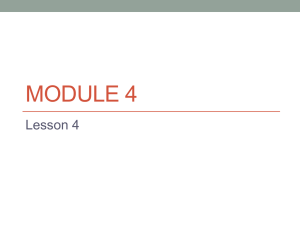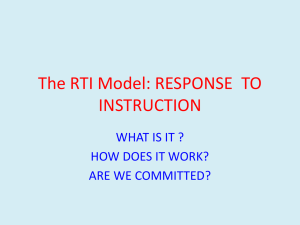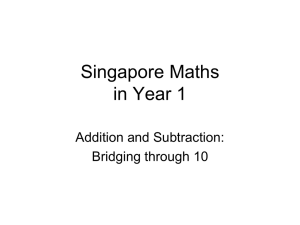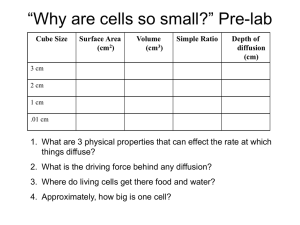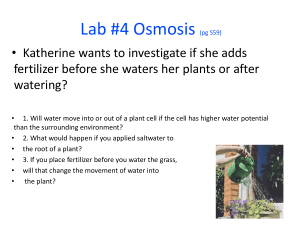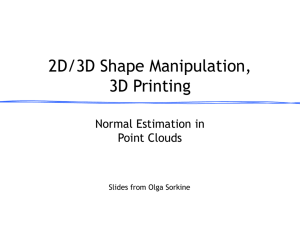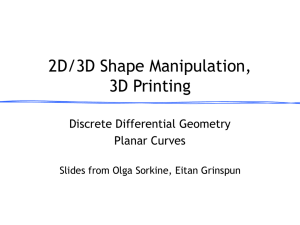Surface Reconstruction
advertisement
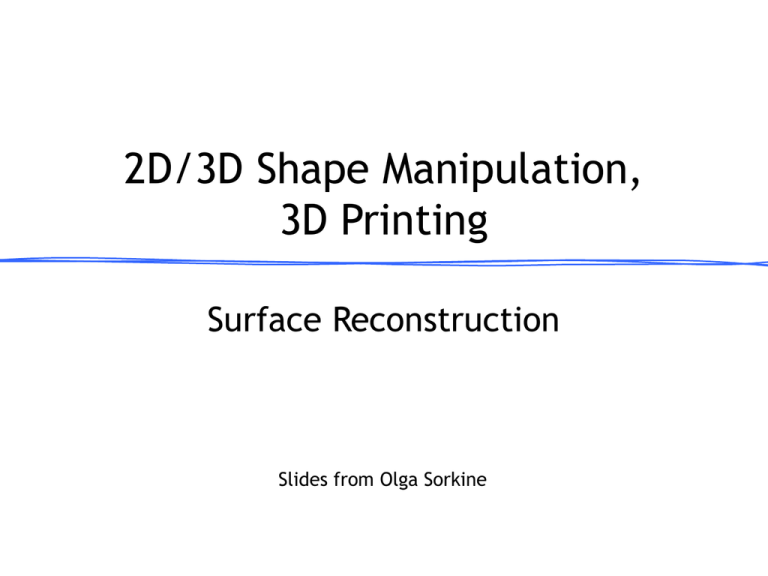
2D/3D Shape Manipulation, 3D Printing Surface Reconstruction Slides from Olga Sorkine March 6, 2013 Geometry Acquisition Pipeline Scanning: Registration: results in range images bring all range images to one coordinate system March 6, 2013 Stitching/reconstructi on: Integration of scans into a single mesh Olga Sorkine-Hornung # 2 Postprocess: • Topological and geometric filtering • Remeshing • Compression Digital Michelangelo Project 1G sample points → 8M triangles March 6, 2013 4G sample points → 8M triangles Olga Sorkine-Hornung # 3 Registration ● Iterative Closest Points (ICP): Efficient Variants of the ICP Algorithm March 6, 2013 Connelly Barnes # 4 Input to Reconstruction Process ● Input option 1: just a set of 3D points, irregularly spaced Need to estimate normals next class ● Input option 2: normals come from the range scans set of raw scans March 6, 2013 Olga Sorkine-Hornung # 5 reconstructed model How to Connect the Dots? ● Explicit reconstruction: stitch the range scans together March 6, 2013 Olga Sorkine-Hornung # 6 How to Connect the Dots? ● Explicit reconstruction: stitch the range scans together Connect sample points by triangles Exact interpolation of sample points Bad for noisy or misaligned data Can lead to holes or non-manifold situations March 6, 2013 Olga Sorkine-Hornung # 7 How to Connect the Dots? ● Implicit reconstruction: estimate a signed distance function (SDF); extract 0-level set mesh using Marching Cubes March 6, 2013 Olga Sorkine-Hornung # 8 How to Connect the Dots? ● Implicit reconstruction: estimate a signed distance function (SDF); extract 0-level set mesh using Marching Cubes March 6, 2013 Olga Sorkine-Hornung # 9 How to Connect the Dots? ● Implicit reconstruction: estimate a signed distance function (SDF); extract 0-level set mesh using Marching Cubes Approximation of input points Watertight manifold results by construction March 6, 2013 Olga Sorkine-Hornung # 10 How to Connect the Dots? ● Implicit reconstruction: estimate a signed distance function (SDF); extract 0-level set mesh using Marching Cubes Approximation of input points Watertight manifold results by construction <0 0 March 6, 2013 >0 Olga Sorkine-Hornung # 11 Implicit vs. Explicit Input Implicit March 6, 2013 Olga Sorkine-Hornung Explicit # 12 SDF from Points and Normals ● Compute signed distance to the tangent plane of the closest point - ● Normals help to distinguish between inside and outside March 6, 2013 Olga Sorkine-Hornung # 13 + SDF from Points and Normals ● Compute signed distance to the tangent plane of the closest point ● Problem?? March 6, 2013 Olga Sorkine-Hornung # 14 SDF from Points and Normals ● Compute signed distance to the tangent plane of the closest point ● The function will be discontinuous March 6, 2013 Olga Sorkine-Hornung # 15 Smooth SDF ● ● Instead find a smooth formulation for F. Scattered data interpolation: F is smooth Avoid trivial March 6, 2013 0 0 0 Olga Sorkine-Hornung # 16 0 Smooth SDF ● Scattered data interpolation: F is smooth Avoid trivial 0 0 ● Add off-surface constraints March 6, 2013 0 Olga Sorkine-Hornung # 17 0 Radial Basis Function Interpolation ● RBF: Weighted sum of shifted, smooth kernels Scalar weights Unknowns March 6, 2013 Olga Sorkine-Hornung Smooth kernels (basis functions) centered at constrained points. For example: # 18 Radial Basis Function Interpolation ● Interpolate the constraints: 0 0 0 March 6, 2013 Olga Sorkine-Hornung # 19 0 Radial Basis Function Interpolation ● Interpolate the constraints: Symmetric linear system to get the weights: March 6, 2013 Olga Sorkine-Hornung # 20 RBF Kernels ● Triharmonic: Globally supported Leads to dense symmetric linear system C2 smoothness Works well for highly irregular sampling March 6, 2013 Olga Sorkine-Hornung # 21 RBF Kernels ● Polyharmonic spline ● Multiquadratic ● Gaussian ● B-Spline (compact support) March 6, 2013 Olga Sorkine-Hornung # 22 RBF Reconstruction Examples March 6, 2013 Olga Sorkine-Hornung # 23 Off-Surface Points Insufficient number/ badly placed off-surface points March 6, 2013 Properly chosen off-surface points Olga Sorkine-Hornung # 24 Comparison of the various SDFs so far Distance to plane March 6, 2013 Compact RBF Olga Sorkine-Hornung Global RBF Triharmonic # 25 RBF – Discussion ● ● Global definition! Global optimization of the weights, even if the basis functions are local March 6, 2013 Olga Sorkine-Hornung 0 0 0 # 26 0 Extracting the Surface Wish to compute a manifold mesh of the level set F(x) = 0 surface F(x) < 0 inside Image from: www.farfieldtechnology.com ● F(x) > 0 outside March 6, 2013 Olga Sorkine-Hornung # 27 Sample the SDF March 6, 2013 Olga Sorkine-Hornung # 28 Sample the SDF March 6, 2013 Olga Sorkine-Hornung # 29 Tessellation Want to approximate an implicit surface with a mesh ● Can‘t explicitly compute all the roots ● Sampling the level set is hard (root finding) ● Solution: find approximate roots by trapping the implicit surface in a grid (lattice) + - - - March 6, 2013 Olga Sorkine-Hornung # 30 Marching Squares 16 different configurations in 2D ● 4 equivalence classes (up to rotational and reflection symmetry + complement) ● … … March 6, 2013 Olga Sorkine-Hornung # 31 Tessellation in 2D ● 4 equivalence classes (up to rotational and reflection symmetry + complement) ? March 6, 2013 Olga Sorkine-Hornung # 32 Tessellation in 2D ● Case 4 is ambiguious: ● Always pick consistently to avoid problems with the resulting mesh March 6, 2013 Olga Sorkine-Hornung # 33 3D: Marching Cubes Layer k+1 Layer k March 6, 2013 Olga Sorkine-Hornung # 34 Marching Cubes ● Marching Cubes (Lorensen and Cline 1987) 1. Load 4 layers of the grid into memory 2. Create a cube whose vertices lie on the two Layer k+1 middle layers 3. Classify the vertices of Layer k the cube according to the implicit function (inside, outside or on the surface) March 6, 2013 Olga Sorkine-Hornung # 35 Marching Cubes 4. Compute case index. We have 28= 256 cases (0/1 for each of the eight vertices) – can store as 8 bit (1 byte) index. v8 v7 e7 e8 e6 v5 v6 e5 e5 e10 v4 v3 e2 e1 v2 index = v1 v2 v3 v4 v5 v6 v7 v8 March 6, 2013 e10 e9 e3 e4 v1 v6 e12 e11 e9 e6 v1 e4 e1 index = 0 0 1 0 0 0 0 1 = 33 Olga Sorkine-Hornung # 36 Marching Cubes ● Unique cases (by rotation, reflection and complement) March 6, 2013 Olga Sorkine-Hornung # 37 Tessellation 3D – Marching Cubes 5. ● Using the case index, retrieve the connectivity in the look-up table Example: the entry for index 33 in the look-up table indicates that the cut edges are e1; e4; e5; e6; e9 and e10 ; the output triangles are (e1; e9; e4) and (e5; e10; e6). e6 e5 e10 e9 v1 March 6, 2013 v6 e4 index = 0 0 1 0 0 0 0 1 = 33 e1 Olga Sorkine-Hornung # 38 Marching Cubes 6. Compute the position of the cut vertices by linear interpolation: 7. Move to the next cube March 6, 2013 # Marching Cubes – Problems ● 3 Have to make consistent choices for neighboring cubes – otherwise get holes – 3 March 6, 2013 Olga Sorkine-Hornung # 40 Marching Cubes – Problems ● Resolving ambiguities No Ambiguity Ambiguity March 6, 2013 Olga Sorkine-Hornung # 41 Resolving Ambiguities ● Marching Cubes 33 March 6, 2013 Connelly Barnes # 42 Resolving Ambiguities March 6, 2013 Connelly Barnes # 43 Resolving Ambiguities March 6, 2013 Connelly Barnes # 44 Marching Cubes 33 March 6, 2013 Connelly Barnes # 45 Marching Cubes 33 March 6, 2013 Connelly Barnes # 46 Libraries ● Short, portable code: Paul Bourke -- Marching Cubes / Marching Tetrahedrons ● Part of larger libraries/programs: OpenMesh MeshLab March 6, 2013 Connelly Barnes # 47 Marching Cubes – Problems ● ● Grid not adaptive Many polygons required to represent small features Images from: “Dual Marching Cubes: Primal Contouring of Dual Grids” by Schaeffer et al. March 6, 2013 Olga Sorkine-Hornung # 48 Marching Cubes – Problems March 6, 2013 Olga Sorkine-Hornung # 49 Marching Cubes – Problems ● Problems with short triangle edges When the surface intersects the cube close to a corner, the resulting tiny triangle doesn‘t contribute much area to the mesh When the intersection is close to an edge of the cube, we get skinny triangles (bad aspect ratio) ● Triangles with short edges waste resources but don‘t contribute to the surface mesh representation March 6, 2013 Olga Sorkine-Hornung # 50 Grid Snapping ● ● ● Solution: threshold the distances between the created vertices and the cube corners When the distance is smaller than dsnap we snap the vertex to the cube corner If more than one vertex of a triangle is snapped to the same point, we discard that triangle altogether March 6, 2013 Olga Sorkine-Hornung # 51 Grid Snapping ● With Grid-Snapping one can obtain significant reduction of space consumption Parameter 0 Vertices Reduction 0,3 0,4 0,46 0,495 1446 1398 1254 1182 1074 830 830 0 18,3 25,7 42,6 42,6 March 6, 2013 0,1 3,3 0,2 13,3 Olga Sorkine-Hornung # 52 Sharp Corners and Features ● (Kobbelt et al. 2001, a.k.a "Extended Marching Cubes"): Evaluate the normals (use gradient of F) When they significantly differ, create additional vertex March 6, 2013 Olga Sorkine-Hornung # 53 Sharp Corners and Features March 6, 2013 Olga Sorkine-Hornung # 54 Thank You March 6, 2013

